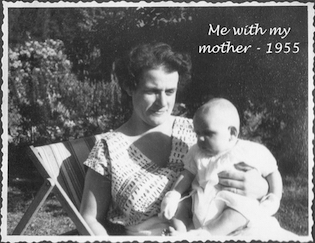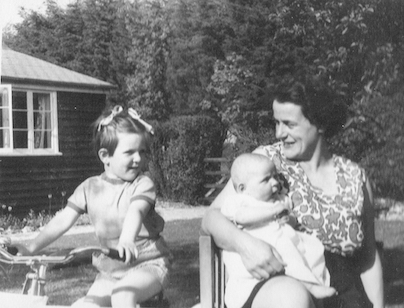One Young Fool in Dorset
Read One Young Fool in Dorset Online
Authors: Victoria Twead
Tags: #childhood, #memoir, #1960s, #1970s, #family relationships, #dorset, #old fools


IN
DORSET

New York Times and Wall Street Journal Bestselling
Author
One Young Fool in Dorset
is the prequel to the
‘Old Fools’ series.
Also available in Paperback and Large Print
editions.
In loving memory of Jean and Frank.
And with heartfelt thanks to Annabel
who shared her parents with me so unselfishly.
Preview of Chickens, Mules and Two Old
Fools
Childhood and Dorset Recipe Index
Perhaps I’m two years old, maybe less. There is a
garden, and two big strong legs. The legs belong to Lena, our
German nanny. A wicker laundry basket sits beside me. I’m not
interested in the legs. Neither do I care about the wicker basket.
I’m far too busy marvelling at the perfectly spherical little balls
I’m finding in the grass. I amuse myself by collecting a pile. I
pick them up and drop them. They roll down the bank. I taste one.
It isn’t nice.
“She’s playing with rabbit droppings,” pipes a voice
above me. My big sister. “And now she’s eating them.”
Lena swipes the little balls from my chubby grasp. I
howl, but not for long. There is always something else to
explore.
* * *
Now I’m four and play in the front more than the
back, sharing toys with neighbouring kids. We live in a leafy
cul-de-sac lined with white houses, each identical to its
neighbour. There are tall pine trees where red squirrels twitch and
dance. Our quiet street opens onto a bigger, much busier road,
noisy with traffic. Sometimes a big black limousine, with a Union
Jack flag fixed to the bonnet, passes by. White motorcycles, ridden
by men dressed in white uniforms, surround the limousine.
“There’s somebody important in that black car,” says
my big sister.
My sister is four years older than me and already
knows stuff. She is clever and her hair is straight and shiny. Mine
is unruly and points in all directions.
“
Wer?
” I ask in German. “Who?”
“I don’t know, but those men on motorcycles are
called the White Rats.”
I watch, fascinated, until the convoy passes.
It is Germany in the late 1950s and we are stationed
in Bonn because my father is an officer in the Army.
“We’re going to help at the cocktail party tonight,”
says my sister, when the convoy has passed. “We’ll wear our party
dresses and carry trays. Lena says you can help, too.”
I like that idea. My sister has been helping at
cocktail parties for ages, but I’m always told I’m too young. This
will be my first cocktail party. I like my party dress. It is
swishy and white with puffed sleeves, a blue sash and a stiff lacy
petticoat.
Cocktail parties at our house happen often. I sense
that my parents dislike them but they are necessary because of the
Army. Days beforehand, Lena polishes the silver and sweeps the
carpets until everything is spotless. My mother is distracted and
edgy. It all has to be perfect. My father looks handsome,
resplendent in his dress uniform, his moustache bristling.
Upstairs, Lena sponges us down and wipes our faces
and hands.
“Just a lick and a promise today,” she says in
German, “there’s so much to do. Now, go and make a start on getting
dressed. Thank goodness your baby brother is asleep.”
Our clothes are laid out on our beds. My sister and
I dress ourselves as far as we can, petticoat first, then dresses.
I can’t manage the buckles on my party shoes or the many buttons
down the back of my party dress. I toddle off to find Lena.
“You’ve done well,” she says, adjusting my white
socks so that they are the right way round, buckling my shoes and
buttoning the dress. “Now you can go downstairs and hand out
nibbles when the guests arrive. Just for half an hour, mind. Now,
out of my way, and don’t mess up your dress.”
I don’t follow her all the way down. I sit on the
stairs and watch the final preparations through the bannisters. How
pretty Mummy looks with lipstick! How the sherry decanters sparkle
on the sideboard!
The doorbell rings, and Lena hurries away to open
the door to the guests.
Gradually, the room fills up with ladies who screech
with laughter and wear jewellery that flashes signals when the
light catches it. Their husbands stand tall in their uniforms, deep
in conversation with each other. My sister carries a tray and
weaves in and out through the knots of people, pausing to offer
dainty nibbles. My mother wears a painted-on lipstick smile. At
first, I can hear her making conversation using her brittle
telephone voice, then, as the room fills and the noise level rises
to a continuous buzz, I can no longer make out individual
voices.
“Victoria! There you are!” Lena grabs my arm and
helps me down the stairs and into the throng. “Don’t be shy! Take
this bowl and offer it to the guests. Just like your sister is
doing.”
I like the way my party dress rustles and swishes. I
walk though the haze of perfume and forest of legs, then stop and
hold my bowl up. Perhaps my sister has already done her job too
well, because nobody takes any. I move on. Even when I tap on legs,
the guests barely notice me.
I set the bowl carefully back on the sideboard. Now
I just meander between the clusters of people, listening to the
buzz, the sudden brays of laughter, hypnotised by the rustle of my
own skirts. I lift my party dress to see the lacy petticoat
beneath. Then I lift that, too.
“Lena! Victoria has no knickers on! And she’s
showing
everybody!
”
Strong German arms whisk me away and I am put to
bed. The party is over for me and Lena resolves to supervise my
dressing more closely in future.
* * *
I was born in 1955, in Dorchester in the UK, the
nearest hospital to Bovington Army Camp where my father was
stationed. The hospital, built in 1841 from local Portland stone,
has now been converted to flats, but still looks much the same as
it always did. I only just managed to be born on British soil
because six months later our family was sent to Bonn. My sister was
already four years old and my brother was destined to be born two
years later. I was the peanut butter in the middle of the
sandwich.
 My mother, big
My mother, big
sister and me at Bovington
Only ghosts of memories stay with me when I think of
those first five years in Germany. Being Austrian, my mother’s
first language was German, although she was fluent in English, too.
Lena, our nanny, spoke only German. My father, although English,
spoke good German. I grew up knowing only German, but my sister,
who was now at the army school, was already bilingual.
I remember there were monkeys at the petrol station.
I always begged Lena to walk that way so that we could see the
monkeys in the cage. As we passed, the monkeys leapt from one side
to the other, making the cage rattle alarmingly.
I remember walking beside Lena as she pushed my
newborn brother in a huge pram alongside the river Rhine. The water
was brown and the river was so big I could hardly see the other
side. Dirty waves lapped at the bank. I licked at my ice cream
until, horror, the cone crumbled in my hand and the ice cream
splatted on the cement path. I opened my mouth to howl, but stopped
when a dachshund popped up from nowhere and lapped the path clean
with a few deft licks from his pink tongue.
I recall taking a ferry across the Rhine to go to
kindergarten. At Christmas, I remember a wonderful cardboard
structure on a table in the classroom. It was like a church but
with turrets, battlements and windows with arched shutters. Each
little window was numbered and we children took it in turns to open
a set of cardboard shutters every day to reveal a stained-glass
window made from coloured tissue paper. Candles had been lit inside
the structure. It was the first Advent calendar I had ever seen,
and still remains the most beautiful. I suspect it must have been a
huge fire hazard and would certainly have never passed today’s
stringent health and safety rules.
Later, I think I was also sent for a short time to
an army-organised preschool group, where only English was spoken. I
understood very little that the teacher said. I wasn’t happy
because one of the rules was that you had to ask permission to
leave the room if you were going to sneeze. I was terrified that a
sneeze might sneak up on me, unannounced, before I had time to ask
permission to leave the room. And what was the point of saying
‘Present’ when my name was called in the morning? That present
never materialised.
Our car was a black Rover 90 and my sister said it
belonged to the Queen. Apparently we were just borrowing it.
Most of my memories of Germany are mere snatches.
Like the terrifying person called
Schwarz Peter
(Black
Peter) who carried a small whip and followed St. Nicholas (Father
Christmas) looking for bad children to punish; eating yoghurt from
glass jars with long spoons; the children’s book
Der
Struwwelpeter
(Shockheaded Peter) which showed a boy who never
cut his hair or nails, a cautionary tale to scare young children;
and staring curiously at the floppy thing the boy next door kept in
his underpants and insisted on showing me whenever he had the
opportunity.
When I was five, the family returned to Dorset,
England, leaving Lena behind. But my parents refused to stay in
Army quarters this time, and the search began for ‘the perfect
house’.